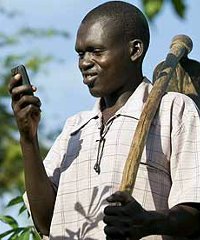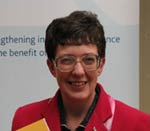The Platform for African-European partnership for Agricultural Research for Development (PAEPARD) in collaboration with The Regional Universities Forum for Capacity Building in Agriculture (RUFORUM) has organised a five-day facilitators' Inception Workshop of the PAEPARD Project. The main objective of this workshop is to familiarise participants with their potential role as facilitators of "agricultural innovation partnerships" established with the support of the PAEPARD project.
The workshop is daily documented by one of the participants (Nawsheen Hosenally from Mauritius)
Day 1 – Monday 28th November 2011: Introduction to PAEPARDThe theme for the first day of the workshop was “Introduction to PAEPARD”.
The question of the open space was "You have been selected as a 'facilitator of multi-stakeholder innovation processes: Which theme do you think is essential to discuss - from your experience with ARD multi-stakeholder innovation processes in - in a sub-workshop?"
The 8 sub-workshops were on the following topics:
1. How to identify relevant partners within a multi-stakeholder partnership?
2. How to balance/manage power imbalances within a consortium?
3. How can we reinforce capacities to work in partnership?
4. How can we manage stakeholders in a team? Divide roles and overcome mistrust
5. How can we keep ourselves relevant and in demand by the partnership?
6. How do we harmonise our work methods when we are driven by different ideologies?
7. How can we maintain neutrality in our facilitation?
8. How can we share financial and information resources in a sustainable partnership?
Day 2: Tuesday 29th November 2011: Facilitation of ARD Partnerships
The theme for Day 2 was "Facilitation of ARD Partnerships" and the aim was that all participants know about the role of a facilitator in a multi-stakeholder partnership.
Day 3 - Wednesday 30th November 2011: Facilitation Tools
Role Play
The first session of Day 3 was a role-play by Janet Achora and Monica Kapiriri Namumbya (both from Uganda), whereby Monica had to approach Janet (consortium) as the Agricultural Innovation Facilitator by PAEPARD.
Moderation, Coordination, Facilitation and Leadership
This session discussed the differences between Moderation, Coordination, Facilitation and Leadership.There were 3 boards in front, on each one there was a question, written on a card of different colours:
Green Card: Achieve the task (Common objectives)
Blue Card: Manage the team and avoid conflict
Pink Card: Promote learning by partners
Research Questions
The last exercise for the day was about Research Questions. Each country pair had to work together on their respective concept notes and had to generate 5 research questions and 3 sub-questions for each of the selected concept notes of the Second round of the PAEPARD call ARD proposals
Day 4 - Thursday 1st December 2011: Designing a partnership facilitation process
Presentation on PAEPARD Inception Workshop - June 2011
The objective was for participants to have an idea about how an inception workshop was organised by PAEPARD in the past and the points to keep in mind while planning and implementing the workshop. There are 4 steps which are involved for a concept note to become a formal proposal and the example given was from the PAEPARD First Call:
- Original proposal to PAEPARD
- Concept Note (Draft) drafted as a result of the PAEPARD Inception Workshop
- Complete Concept Note
- Draft Proposal Write-shop to generate formal proposal (submission)
Each country pair was asked to design a timeline of 3 months on the type of activities they will organise with respect to their respective consortium and also the specific output/milestone achieved for each proposed activity.
Video Projection
Mrs. Habiba Hassan Wassef of Egypt, talks about how Africans should be aware of their Intellectual Property Rights before sharing their views with Europeans.
Financing ARD
To understand about how ARD can be financed, a document from ICRA, which contained key concepts on how to finance ARD were given to the participants, who were asked to read the document. Then there was a brainstorming session to find the possible finance sources at National Level, Sub-Regional Level (Africa) and International Level.
Presentation by ASARECA
To get a better idea of how ARD are financed in Africa, there was a presentation by Mr. Joseph Methu from ASARECA. He explained about how ASARECA does the coordination work regarding financing of ARD in the East Africa Region.
Statements from World Bank
This session was a presentation on a report from the World Bank: IMPLEMENTING AGRICULTURAL INNOVATION FUNDS: Lessons from Competitive Research and Matching Grant Projects.. From that Report, different statements were taken and presented to the participants.
- Statement 1: The more a call is competitive – and selective, the less facilitators will be asked to play an intermediation role, as the investment will have less chances to lead to a return.
- Statement 2: Competitive grants strengthen the strongest actors and do not reduce the disparities between the strong and the weak.
- Statement 3: Mainly the growing rhetoric’s among the agricultural research and development partners to become more accountable to the beneficiary and other stakeholders has necessitated the need for partnerships and new funding schemes
- Statement 4: Only organizations which have a minimum budget , a critical mass of staff and a research and innovation management capacity can compete in competitive grants
The last session for Day 4 was about the proposal formulation. Participants were given a document on points to be taken into consideration while doing a proposal formulation.
Participants:
Achora Janet Cox
Senior Programme Officer
Women of Uganda Network
ADIMOU Jean – Baptiste
ADIMOU Jean – Baptiste
Coordonnateur du Groupe d’appui, d’Encadrement et de Recherche en Milieu rural – GERME
ADJEI-NSIAH SamuelSenior Research Fellow, Forest and Horticultural Crops Research Centre. Kade
College of Agriculture and Consumer Sciences
University of Ghana
College of Agriculture and Consumer Sciences
University of Ghana
Lecturer, Department of Economics,
Secrétaire Permanent de la Plateforme Nationale des Organisations Paysannes et de Producteurs Agricoles du Bénin,University of Ibadan
PNOPPA, Benin
BIGIRIMANA Jean ClaudeChercheur à l'institut des sciences agronomiques du Burundi dans le Programme de Production des Semences et les Ressources Phytogénétques.
Directeur exécutif de l’ONG
« Initiatives pour un Développement Intégré Durable du Burkina Faso
Technical Service Manager at the NAADS Secretariat
Chargée de communication et marketing
à la Fédération agricole Nian-Zwé
Organisation Non Gouvernementale EMMANUEL
Directeur Général de la Coopérative des commerçantes de vivriers de Cocody
(COCOVICO)
(COCOVICO)
NAADS COORDINATOR, BUSIA DISTRICT
Agricultural Economist
Secrétaire Général
de la Plate-forme Nationale pour l’Innovation
dans le Secteur Agricole au
Benin (PNISA-Bénin)
Gunesh ToolseeBenin (PNISA-Bénin)
Manager, Farmers Service Corporation
Mauritius
Project Manger – Support Farmer Organizations in Africa Project (SFOAP)
Uganda National Farmers Federation
Uganda National Farmers Federation
Local Development Ressource at ODECO
Cameroon
Independent consultant
Uganda
Sales Coordinator
Meaders Feeds Ltd
Lecturer at the department of rural Economics, university of Burundi
Lecturer Methodist University College Ghana,
Faculty of Agriculture
Rural Development Consultancy (RDC) Ndop,
North West Region, Cameroon
Coordinator and lead consultant
Coordinator and lead consultant
Country Coordinator
Research Into Use
Ministry of Agriculture, Forestry and Food Security
Research Into Use
Ministry of Agriculture, Forestry and Food Security
Chargé de communication et information
Fédération des Organisations des Producteurs Agricoles du Congo
















































